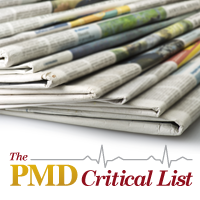- Revenue Cycle Management
- COVID-19
- Reimbursement
- Diabetes Awareness Month
- Risk Management
- Patient Retention
- Staffing
- Medical Economics® 100th Anniversary
- Coding and documentation
- Business of Endocrinology
- Telehealth
- Physicians Financial News
- Cybersecurity
- Cardiovascular Clinical Consult
- Locum Tenens, brought to you by LocumLife®
- Weight Management
- Business of Women's Health
- Practice Efficiency
- Finance and Wealth
- EHRs
- Remote Patient Monitoring
- Sponsored Webinars
- Medical Technology
- Billing and collections
- Acute Pain Management
- Exclusive Content
- Value-based Care
- Business of Pediatrics
- Concierge Medicine 2.0 by Castle Connolly Private Health Partners
- Practice Growth
- Concierge Medicine
- Business of Cardiology
- Implementing the Topcon Ocular Telehealth Platform
- Malpractice
- Influenza
- Sexual Health
- Chronic Conditions
- Technology
- Legal and Policy
- Money
- Opinion
- Vaccines
- Practice Management
- Patient Relations
- Careers
The PMD Critical List: Celebrities Shell Out for Unusual Medical Procedures
Elective medical procedures are all the rage with celebrities – and we’re talking way beyond nose jobs and breast augmentations. That story tops this week’s PMD Critical List.

Elective medical procedures are all the rage with celebrities — and we’re talking way beyond nose jobs and breast augmentations. That story tops this week’s PMD Critical List. Also making the list: Moms are all about telemedicine, physician social networks benefit patients, and how Donald Trump’s presidential win affect healthcare.
• Celebrities Love Wacky Medical Procedures (New York Post)
“What’s the hottest accessory for high-flyers? Their doctors.” According to this news report from the New York Post, more and more celebrities are seeking out pricey doctors for unusual elective procedures. “Whether these patients are having these special techniques for the right reasons is up for debate.”
• The Doctors Who Solve Medical Mysteries (Wall Street Journal)
“When patients have a disease that can’t be diagnosed, they get sent to Dr. Wendy Chung, who heads the Discover program at New York Presbyterian/Columbia University Medical Center, which uses genetics to diagnose rare and complex diseases that have eluded traditional doctors and specialists.”
• New Physician Fee Schedule Draws Mixed Reaction (Health Media Leaders)
“The recently finalized Centers for Medicare & Medicaid Services 2017 Physician Fee Schedule emphasizes support for primary care. However, the extent to which the new rules and codes will actually benefit primary care physicians depends on whom you ask.” The ACP and AAFP differ.
• A Closer Look at the Doctor Shortage (The New York Times)
“As with almost everything in our health care system, it’s complicated. Some people think there’s no shortage at all—just a poor distribution of the doctors we have. Parts of this country have lots of doctors, perhaps too many. Other parts, not enough doctors. The system isn’t undermanned: It’s inefficient.”
• Mothers Want 24/7 Access to Physicians (Business Wire)
According to a new Moms and Health Technology Survey, American “moms are constantly looking for better and easier ways to manage their family’s health, with all agreeing (100%) that having round the clock access to a doctor would be helpful.” And 80% are interested in learning more about telemedicine.
• Tight Social Networks of Physicians May Improve Patient Outcomes (News-Medical.net)
To get the best results for patients, it may pay for their doctors to think like a team. “A new University of Michigan study finds that heart surgery patients' chances of survival depends in part on the overall level of teamwork among all the physicians who cared for them across their surgery preparation, operation, hospitalization and recuperation.”
• How Will Donald Trump's Presidency Affect Healthcare? (Becker’s Hospital Review)
As the healthcare industry prepares for a Trump presidency in 2017, there is a great deal of wondering about how things will and won’t change. Here are some thoughts from several leading healthcare executives and physicians on how the future of medicine might look.
• Physicians Do Mea Culpa on Prescription Opioid Abuse (InCrowd)
“US physicians who prescribe opioid pain medications are owning their role in today’s opioid abuse while citing structural problems that feed the issue, and calling for more alternative therapies integrated with medication,” according to InCrowd, a provider of real-time market intelligence to life sciences and healthcare firms.
• The Allure of Cheap Doctors, Drugs and Dentists in Mexico (USA Today)
“In Southern California, if people haven't gone to Mexico for health care, they probably know someone who has. People overburdened by the price of getting what's supposed to be some of the best health care in the world are willing to seek out options that would have seemed overly risky not long ago,” finds a troubling report from the Center for Health Journalism.
• Under 10% of Physician Use EMRs to Full Capabilities (Healthcare IT News)
According to a new CDC report, State Variation in Electronic Sharing of Information in Physician Offices, while 80% of physicians have EMRs, only 9% took advantage of all four functions for efficient EMR usage—electronically sent, received, integrated, or searched for patient health information.
• Dentists Uniquely Positioned to Deal with Childhood Obesity (ADA.org)
"Dentists have a remarkable opportunity to bring the topic of sugar consumption into a team based conversation of disease prevention and overall health," says the director of the ADA Council on Advocacy for Access and Prevention. More than 75% of “patients are willing to have their height and weight documented by their dentist.”
• Sick Dogs Could Unlock the Mysteries of Immunotherapy (MIT Technology Review)
“NIH scientists say they need animal models that imitate the human immune system to study the effects of novel cancer drugs. An advisory committee at the National Cancer Institute is starting a new program in 2017 to study experimental immunotherapies in dogs with cancer.”
